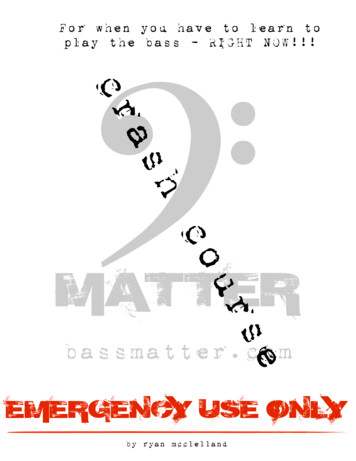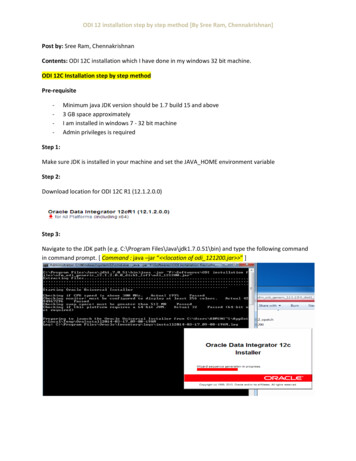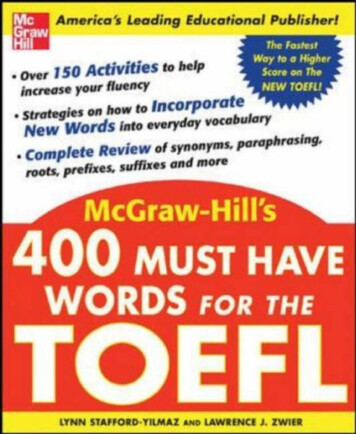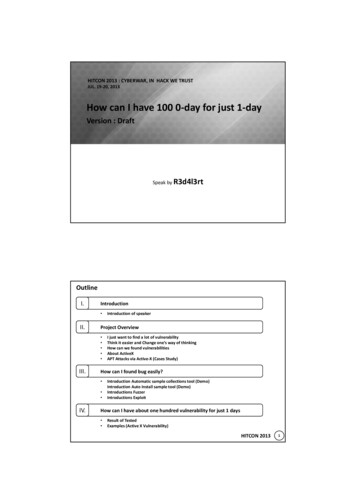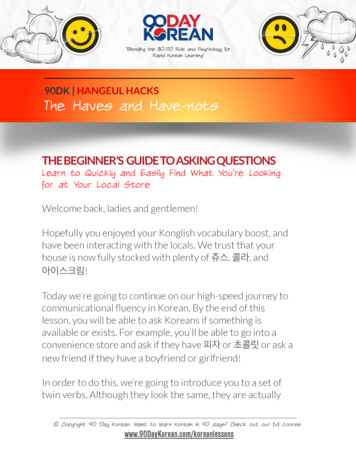
Transcription
"Blending the 80/20 Rule and Psychology forRapid Korean Learning!90DK HANGEUL HACKSThe Haves and Have-notsTHE BEGINNER’S GUIDE TO ASKING QUESTIONSLearn to Quickly and Easily Find What You’re Lookingfor at Your Local StoreWelcome back, ladies and gentlemen!Hopefully you enjoyed your Konglish vocabulary boost, andhave been interacting with the locals. We trust that yourhouse is now fully stocked with plenty of 쥬스, 콜라, and아이스크림!Today we’re going to continue on our high-speed journey tocommunicational fluency in Korean. By the end of thislesson, you will be able to ask Koreans if something isavailable or exists. For example, you’ll be able to go into aconvenience store and ask if they have 피자 or 초콜릿 or ask anew friend if they have a boyfriend or girlfriend!In order to do this, we’re going to introduce you to a set oftwin verbs. Although they look the same, they are actually Copyright 90 Day Korean. Want to learn Korean in 90 days? Check out our full course:www.90DayKorean.com/koreanlessons
very different. You see, one is the good twin who is alwaysoptimistic. The other is a bad twin who is always pessimistic.Please say “hello” to:THE BAD TWINTHE GOOD TWINVERBVERB없어요있어요Let’s first cover pronunciation. If you took the 90 MinuteChallenge and are Romanizing the text, then you probablyknow that the pronunciation should be something like ry good! That is correct according to the basic rulesof Korean pronunciation.However, there are some special pronunciation rules inKorean (but these aren’t important to know just yet)! Copyright 90 Day Korean. Want to learn Korean in 90 days? Check out our full course:www.90DayKorean.com/koreanlessons
Instead, it’s better to commit the correct pronunciation tomemory so you can be easily understood by Koreans.Luckily it’s almost exactly the same!You should pronounce them more like this:THE BAD TWINROMANIZEDSOUNDS LIKE없어요업써요eobs-eo-yoeob-sseo-yoTHE GOOD TWINROMANIZEDSOUNDS LIKE있어요이써요iss-eo-yoi-sseo-yoOk, so now that you’ve got the pronunciation down, let’sfigure out the personalities of these twin verbs. Copyright 90 Day Korean. Want to learn Korean in 90 days? Check out our full course:www.90DayKorean.com/koreanlessons
THE BAD TWIN(없어요)THE GOOD TWIN(있어요)MEANINGMEANINGTO NOT HAVETO HAVEAha! Now it makes sense why one is the good twin, and oneis the bad one.있어요 has a positive and optimistic personality, and it means“to have”. 없어요 has a negative and pessimistic personality,and it means “to not have”.In fact, 없어요 is so pessimistic that when someone doesn’thave what he is looking for, he changes completely! That’show he earned his reputation as the bad twin. He gets soUPSET if he can’t have what he wants!없어요?“up”-sseo-yoUPSET Copyright 90 Day Korean. Want to learn Korean in 90 days? Check out our full course:www.90DayKorean.com/koreanlessons
You don’t want to be around him when he’s like this!On the other hand, the good twin 있어요 just goes about lifewith more of a que sera, sera “whatever will be will be”attitude. If someone has what he is looking for, he is content!It’s not the happiest thing that’s ever happened to him, it just“is.”Must be nice to have such an “it is what it is” attitude! He’sso positive!있어요?“is”-sseo-yoISOk, got it. So how do we use these, you might ask?If you’ve come this far, you’re in luck. You see, these verbsare ready to go right out of the box. This means that all youhave to do is plug in a noun before them, and POW—you’reready to chat away. Here’s what the format will look like:noun 있어요 (I have noun)noun 없어요 (I don’t have noun) Copyright 90 Day Korean. Want to learn Korean in 90 days? Check out our full course:www.90DayKorean.com/koreanlessons
Let’s plug a noun in there:콜라 있어요 (I have cola)콜라 없어요 (I don’t have cola)If you’re wondering where the “I” is in the Korean sentence,that’s a great observation! In Korean, the subjects of thesentence aren’t always specifically mentioned. It’s oftenbased on context. This is good news for you, since sentenceswill be much simpler to make!So how do we turn this into a question? Very easily! Thesentence will be exactly the same. The only difference will bein the intonation. You’re going to say the same sentence,except this time you’ll add a slight inflection in your voice,making the ending “요” a bit higher.You’ll do this by imagining that you’re really not sure aboutwhether or not the other person has what you’re looking for,so you’ll show this uncertainty by changing your intonationat the end of the 있어요 or 없어요. It will look like: 없어요?있어요?eob-sseo-yo? i-sseo-yo? Copyright 90 Day Korean. Want to learn Korean in 90 days? Check out our full course:www.90DayKorean.com/koreanlessons
Remember what we said about context? Well, that’s going toapply here as well with the questions. So, it’ll be the sameexact sentence content. However, since you’re addinginflection to your voice when speaking to another person,they’ll know it’s a question directed toward them. It’ll looklike this: noun 있어요? (Do you have noun?) noun 없어요? (You don’t have noun?) For example:콜라 있어요? (Do you have cola?) 콜라 없어요? (You don’t have cola?)Both of these questions have the same meaning, so you caninterchange 있어요 and 없어요. Let’s take a look at somesample conversations.Imagine, you pop into the new GS 25 convenience store thatjust opened up in the neighborhood on a mission to grabsome 주스 and 초콜릿. Copyright 90 Day Korean. Want to learn Korean in 90 days? Check out our full course:www.90DayKorean.com/koreanlessons
This is the first time you’ve been in this store, so where tolook first?As you make your way over to the store clerk, you noticethat it’s Korean rap sensation PSY!Shocked and amazed, you hesitantly ask:YOU:PSY:YOU:PSY:주스 있어요?주스 있어요. *he breaks into song and points to juice*초콜릿 있어요?초콜릿 있어요. *he dances, spins and points to chocolate*Photo Credit: Republic of KoreaStarstruck, you pay for your items and are on you way!The next day, imagine you’re going to have some people overyour place. As you look in your drawers and cupboards ofyour kitchen, you notice you’re a little short on forks andcups. Time to head to the supermarket! Copyright 90 Day Korean. Want to learn Korean in 90 days? Check out our full course:www.90DayKorean.com/koreanlessons
Wow, this place is massive! Where to start? You spot a storeemployee and immediately ask:Photo Credit:Ivani ChangYOU:EMPLOYEE:YOU:EMPLOYEE:포크 있어요?포크 있어요. *he points to forks*컵 있어요?컵 있어요. *he points to cups*Don’t worry about singular or plurals for now. Focus onpronunciation and becoming familiar with the nouns you usemost often.Now that you know a basic sentence structure, you can usethis for all kinds of situations! The twins are a versatile set ofverbs. Simply plug in any noun you need, and you’re on yourway.To find more nouns that you want to use in Korean, first finda Korean-English dictionary or check out 90 Day Korean’s Copyright 90 Day Korean. Want to learn Korean in 90 days? Check out our full course:www.90DayKorean.com/koreanlessons
Rapid Korean Learning Blog where we regularly post freelessons and other Korean learning materials that will behelpful!Aside from that, some popular free online dictionaries areNaver Dictionary and Daum Dictionary. In the dictionary,punch in the English word to get the Korean equivalent anduse it to make a question or statement.Let’s see the twins in action around town in differentsituations!AT THE CAFE:YOU:카푸치노 있어요? (Do you have cappuccino?)BARISTA:카푸치노 있어요. (We have cappuccino.)AT THE PHARMACY:YOU:비타민 없어요? (Do you not have vitamins?)PHARMACIST: 비타민 있어요. (We do have vitamins.)AT THE LOCAL KOREAN RESTAURANT:YOU:비빔밥 있어요? (Do you have bibimbap?) Copyright 90 Day Korean. Want to learn Korean in 90 days? Check out our full course:www.90DayKorean.com/koreanlessons
HOST:비빔밥 없어요. 김밥 있어요. (We don’t have bibimbap.We have gimbap.)AT THE MEETUP GROUP:YOU:남자 친구 있어요? (Do you have a boyfriend?)HOST:남자 친구 없어요. 여자 친구 있어요? (I don’t have aboyfriend. Do you have a girlfriend?You’re moving along quite nicely. Remember to make this ahabit and practice any time you’re out! Soon it’ll be secondnature, and you’ll be able to build up your skills quickly.Speaking of building on what you already know, we havesome exciting news about what’s coming up next.At this point, you have the foundation for making some basicconversation in Korean. Next, you’re going to further buildon your interaction skills by making polite requests! Talk totaxi drivers, order at restaurants, ask for a favor — thepossibilities are endless!Learning Korean really is easy when you have these hacks,isn’t it?Remember: to learn Korean fast, always focus on the 20% ofthe language that gives you 80% of the results! Copyright 90 Day Korean. Want to learn Korean in 90 days? Check out our full course:www.90DayKorean.com/koreanlessons
Keep an eye on your inbox for when we release the thirdHangeul Hack!Until then,-The 90 Day Korean TeamWant more lessons like HELLOHELLOHELLOHELLOHELClick here to join the Inner Circle and learn Korean fast! Copyright 90 Day Korean. Want to learn Korean in 90 days? Check out our full course:www.90DayKorean.com/koreanlessons
Rapid Korean Learning Blog where we regularly post free lessons and other Korean learning materials that will be helpful! Aside from that, some popular free online dictionaries are Naver Dictionary and Daum Dictionary. In the dictionary, . Remember: to





